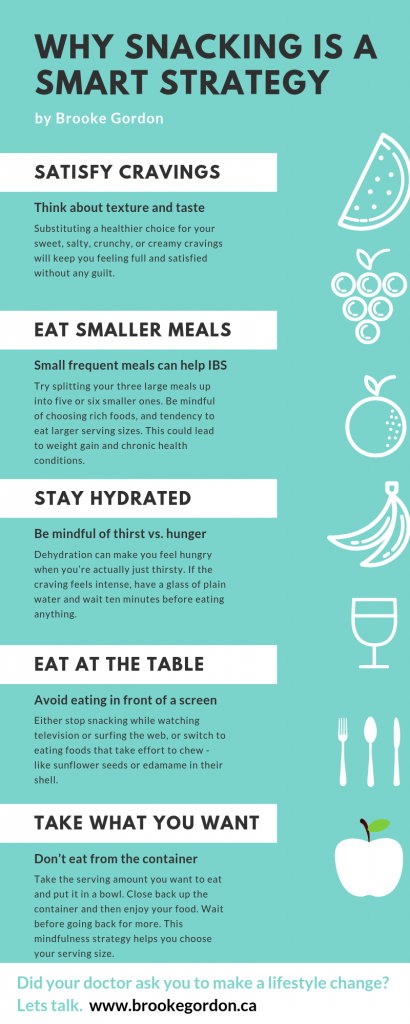Snacking can throw off your best efforts no mater how clear your goal is to eat healthy. You can have the healthiest meals planned out, but there is a long gap between lunch and dinner. If you don’t have a plan, you might buy something from the counter to tide you over. To help you save money and keep within your goals, here are 5 tips to help you snack smarter.
1. Satisfy Your Cravings
Our hormones change throughout the month. I know sometimes all I want is creamy chocolate and other times the salty-crunch of rice crisps. The texture is a huge part of my cravings, which makes it possible to substitute something convenient (but unhealthy) from the store with a healthier alternative. Here are a few ideas:
- For salty and crunchy eat a handful of nuts instead of a bag of chips.
- For a sweet tooth, grab an apple or banana rather than a pack of candy.
- For creamy rich chocolate, try a tablespoon of avocado-chocolate ganache.
- For fast energy on a long walk, pack two frozen energy bites in a bag.
- For a cup of coffee with cream and sugar, have a cup of hot herbal tea with a teaspoon of honey.
Substituting a healthier choice for your sweet, salty, crunchy, or creamy cravings will keep you feeling full and satisfied without any guilt.
 2. Eat Smaller Meals
2. Eat Smaller Meals
If you feel like you have to snack quite a few times a day and just can’t wait for your main meals, you could split your three large meals up into five or six smaller ones. This will keep you feeling full all day while giving your body time to fully digest a smaller amount of food, which can be helpful if you have a condition like IBS.
However, snacking or eating smaller meals more frequently may give your body more energy than it needs. If your clothes start fitting uncomfortably, particularly around the waist, then you might be gaining weight. This can be an early sign of insulin resistance or non-alcoholic fatty liver disease, and is a sign that this is not the right plan for you.
3. Stay Hydrated
Dehydration can make you feel hungry when you’re actually just thirsty. Adults need at least 2L (or 8 cups) of water daily. Make sure you’re drinking water throughout the day to prevent these cravings.
Caffeine and drinks with artificial sweeteners can sometimes cause you to feel hungrier, so stick to plain water infused with berries or cucumber, and non-caffeinated herbal teas. If the craving feels very intense, have a glass of water at least ten minutes before eating anything because it might actually be thirst. This tip has served me well on many days.
p.s. if you love lemon in your water, be careful of how it can affect your teeth. Read more about how drinking lemon water can rot your teeth »
4. Avoid Snacking in Front of the TV or Computer
Try to completely avoid snacking while watching television or surfing the web. Our brains are not good at multi-tasking and may not register that we’ve eaten. This can lead to a hormone imbalance that signals you are hungry even though you’ve finished a bowl of chips.
If that’s a difficult change to make, then consider switching to foods that aren’t loaded with calories. Plain popcorn with 1 Tablespoon of butter, sunflower seeds or edamame in their shell, or a handful of grapes are all healthier options than a bag of chips. These types of snacks take quiet awhile to chew and can capture the texture that you’re craving – crunchy or smooth, or the taste – salty or sweet.
5. Don’t eat from the container
I am blessed to have a supportive spouse who is also passionate about living a long and vibrant life. One of the tips I learned from him was to take the serving I wanted from the container and put it in a bowl. Close back up the container and then enjoy my food.
It’s not that you can’t go back and have more but the action of choosing your portion size amplifies the mindful aspect of eating food and gives your brain time to register that you’ve eaten. By using this technique you may find that you can’t even finish what’s in the bowl because you weren’t that hungry. You might have been feeling bored or nervous and eating wasn’t actually the thing your body needed.
Final thoughts
You don’t have to give up your afternoon snack in order to practice healthy eating habits, just choose your snacks more wisely. Picking a lower calorie variety of your favourite snack can be the first step towards meeting your goals. Swapping a different type of food altogether, cutting down on how much you eat, or eliminating a snack after dinner are all options to explore. Start off slowly and find substitutes that satisfy your craving for taste and texture – letting your body adapt to the change. This strategy will result in long term success.